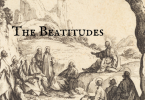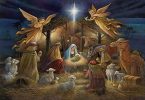29th Sunday of Ordinary Time (Year A)
Scripture: Is. 45:1, 4-6; Ps. 96: 1, 3-5, 7-10; 1 Thes. 1:1-5; Mt. 22:15-21
Today’s liturgy responds to the much-discussed question of whether we should be loyal to the state or to God. What should be our obligation? In the recent past, we have seen the politics and the church has come into conflict. The Church personnel in India are dragged into controversies while they conscientise the faithful. American politicians are challenging the Vatican to do away negotiation with the Chinese government. Someone once rightly said, in every age, every culture and every state, the Christians are challenged to balance between the demands of state and commands of God. The early Christians such as St. Sebastian, in the middle ages St. Thomas More and in the modern age St. Oscar Romero are the witnesses of this challenging situation.
Jesus also faced challenging situations in his life. The introductory verses to the Gospel give us the motive of questioning Jesus. It was a plot to trap Jesus. There is a series of questions put to Jesus but Jesus silenced his critics with his wisdom. The question was put by the Pharisees and the Herodians. These were two prominent Jewish groups along with the Sadducees at the time of Jesus. The Pharisees opposed taxes; they were nationalists. They were anti-Romans. The Herodians were collaborators of the Romans. They hoped to get personal benefits by associating themselves with Romans just like their king.
The Romans extracted heavy taxes from the Jews. There were taxes on practically everything. People had to pay taxes for land, export and import, a crop tax (one-tenth of the grain and one – fifth of the wine and oil), an income tax (one per cent of a man’s income), road tax, sales tax, a salt tax, emergency tax, etc. The Jews also paid a temple tax. The rich and the poor felt the burden of these taxes. The question asked by the Pharisees and the Herodians: Is it permissible to pay taxes to Ceaser or not? This question concerned the census tax. This tax amounted to one denarius. It was paid every year by a male from the age of fourteen to sixty-five and by a female from the age of twelve to sixty-five years of age.
The Pharisee knew that either answer would land Jesus in a problem. If he were to say that it was unlawful, the Herodians would report to the Roman officials, who would then arrest Jesus for treason. If he were to say that it was lawful to pay, the insurgents would turn against him and he would be discredited in the eyes of the people. Jesus’ answer would have alienated him from one group to another.
Jesus knew the mind of his critics. He also knew their beliefs. The Pharisees and the insurgent Jews believed that they had only one ruler and that was their God. Taxes, or any form of submission, should be made to Yahweh alone. They hated Caesar, the Roman emperor because he called himself God. A little cultural background will help us to know how Jesus tricked them into their own plot.
Firstly, Jesus asked for a coin. The Gospel tells us that one promptly produced it. For any Jew, possession of a Roman coin would be disgraceful because it had his name and the title. It had the name, “Tiberius Caesar, Son of the Divine Augustus” on one side and on the other his title “Pontifex Maximus” (high priest). The bearer of the coin had already settled the question. He had associated himself with the Roman. In such a case, he had no authority to question Jesus. Secondly, Jesus questioned them about whose image was it? They answered Caesar. The image of Caesar indicated authority and ownership. When Jesus told them to give back to Caesar what belongs to Caesar – and to God what belongs to God. He questioned them, “What is it that bears God’s image? The Jews knew that human beings were created in the image and likeness of God. They had to offer themselves to God.
Jesus did not side any group who were seeking answers for their own benefit. Jesus’ personal belief in His Father never brought any conflict in His dealing with the government authority. He dwelt with the officials, Herod, Pilate in his trial with serenity. He did not question their power but He set an example before them that He was in total control of the situation.
We need to learn from Jesus. We are the bearers of the image of God. The first reading tells us that even pagans offered themselves to God. King Cyrus, the Persian king did not know Yahweh yet he acted like the anointed one of God. He used his kingship to serve the God of Israel. Prophet Isaiah teaches the Israelites about the God who has control over pagan kings and kingdoms. The people of Thessalonica who were recent converts to Catholicism, St. Paul praised them for their theological virtues of faith, hope and charity. The new converts also offered themselves to God. Each of them had political difficulties during their time. It did not restrict them from offering to God.
We are also living in similar situations. The readings of today’s liturgy tell us that politics and religion cannot be separated although they are two different areas. We need to know that a good Christian can make a good citizen of the state and a citizen who fails in this state duty is also a failed Christian in his or her life. The USCCB states beautifully on the role of Catholics in political life, “Catholics who bring their moral convictions into public life do not threaten democracy or pluralism but enrich them and the nation. The separation of church and state does not require division between belief and public action, between moral principles and political choices, but protects the right of believers and religious groups to practice their faith and act on their values in public life.” (Catholics in Political Life/USCCB) Let us build our nation with solid principles of our Catholic faith.






